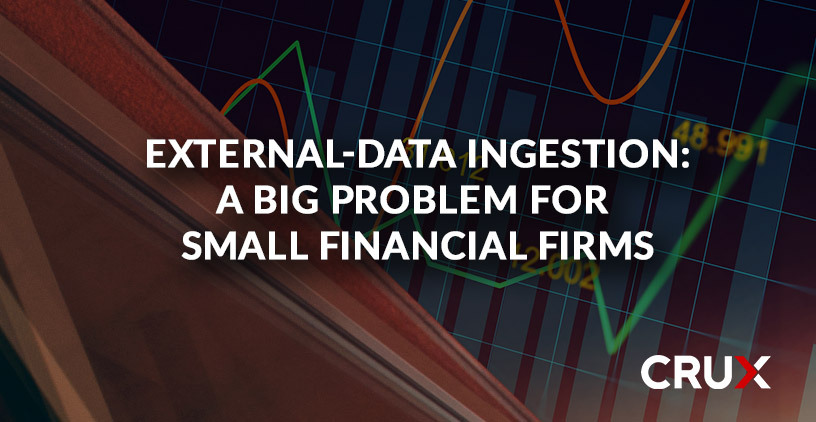What Cloud Marketplaces Do and Don’t Do
Not long ago, we observed here in our blog that the critical insights that drive business value come from data that is both (1) fast and (2) reliable.

In this series, we share insights from our CEO Philip Brittan to help you use data efficiently. Tip #1 explains the value of creating a holistic strategy to find, evaluate, and make use of relevant data. Tip #2 shows how you can efficiently find the data you need. This week, we explore how offloading the first mile to a trusted partner helps your firm move faster and grow.
Tip 3: Offload the first mile to use data smarter and faster.
The first mile of using data largely consists of data engineering, and data engineering takes time. It means applying best practices to ingest, validate, load, and standardize data, and it also means building a platform that can repeat these processes consistently at scale.
Today firms across financial services are spending time, energy, and resources on identical data engineering efforts that add no direct competitive advantage. Every day, hundreds of firms wire up, store, and clean the exact same datasets.
It’s true that each firm adds its own unique IP to the data, but this IP typically takes the form of metadata, analytics, and insights. In other words, creating IP is the second mile of using data.
Given that first mile tasks are largely redundant from business to business, wouldn’t it be better if your firm could skip the non-differentiating tasks entirely? Wouldn’t it be better if your firm could offload the work everyone else is doing to a trusted partner, and focus instead on the work that makes your business unique?
It’s not just repetitive data engineering efforts that your firm can allocate to a trusted partner. Your firm can also offload the need for systems to handle the first mile.
Today many firms have evolved systems to help ingest and distribute data. However, most firms have built these systems over time in a piecemeal fashion by wiring up new data sources quickly as needed. Almost no one has applied clear, common standards to all data to allow decision makers and tech to combine data from different sources. Almost no one has integrated all essential data into one location for teams and algorithms in the front, middle, and back office to access whenever they need it.
The typical firm struggles with a maze of systems to manage data. This infrastructure only becomes more costly, and more challenging to maintain, as new data sources are added. Meanwhile, emerging data regulations urge firms to effectively monitor and control the flow of data from its many sources to its many points of use, presenting a challenge for firms with data swamps.
Furthermore, as the technologies underlying these data management systems change or become obsolete, firms are finding they need to build their systems all over again. As technology accelerates, most financial firms would be better served by a third-party partner to manage data.
At Crux, we believe the next step for financial services is a solution that covers the first mile for everyone. Giving you that solution is our role at Crux. We deliver a single, efficient platform that evolves over time to stay up to date with the latest technologies. Each firm pays a small monthly fee to subscribe to the platform instead of making large investments in technologies that become obsolete over time.
A data management partner like Crux also helps everyone work more efficiently by offering access to data, with expert data engineering service included, at a much lower cost. We create economies of scale by extracting, validating, loading, and standardizing the same dataset once, on behalf of many clients.
That means each client saves time and pays less for the same data, delivered faster, cleaner, and easier to use. By making the data firms need available in the cloud, however and whenever they need it, Crux replaces the need for firms to build the costly systems to manage the flow of data. Instead of wrangling data, monitoring systems, and calling vendors to address outages, your teams can focus on analyzing data to gain valuable insights.
With a trusted partner like Crux delivering data that’s ready to analyze, your skilled talent can devote their full energy to finding insights in data, helping your firm make stronger decisions and grow faster. Your firm is empowered when you free yourself of efforts that do not add direct competitive advantage.
As data and automation transform the economy, businesses will increasingly develop and leverage capabilities that make them unique, instead of performing repetitive and non-differentiating tasks. Firms who sense this future and step ahead of the curve will have a head start on the data-driven economy.

Not long ago, we observed here in our blog that the critical insights that drive business value come from data that is both (1) fast and (2) reliable.

This past year has been exciting, representing the dawning of a new age for artificial intelligence (AI) and machine learning (ML)—with large...

How do you get white-glove customer service from a major data supplier?